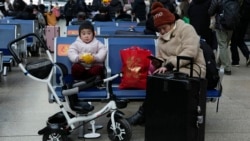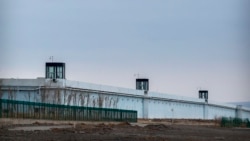Government information from China shows that the number of babies born in China fell again last year to a record low.
The falling number of births could hurt China’s plans to develop the nation.
The ruling Communist Party plans to develop technology and economic growth that can support the nation instead of depending on exports for development. But the fall in population has brought warnings that China may have too few workers to support a growing number of retired people.
Falling numbers
The government reported this month that about 10.6 million babies were born in 2021. That is down 12 percent from the 12 million reported for 2020.
The National Bureau of Statistics reported that the total population was 1.4 billion at the end of 2021. That is an increase of 480,000 from 2020.
The percentage of people aged 16 to 59, the official working age population, fell to 882.2 million. That is 62.5 percent of China’s total population, down from 63.3 percent in 2020. Ten years ago, that percentage was 70.1 percent.
The average number of births per mother was 1.3 in 2020. That number is well below the 2.1 necessary to keep the population from falling.
Song Jian is a professor at the Center for Population and Development at Renmin University in Beijing. He said China needs to “boost the willingness to have children.” He added, “We need to make people feel that having children or forming a family is attractive.”
History
The ruling Communist Party has restricted births since 1980 to slow population growth using its “one-child” policy. It enforced this policy with threats of fines or dismissal from jobs. This led to abuses including forced abortions. Parents who wanted to have a son killed baby girls. This created a higher number of males to females in China.
In 2015, the party permitted each family to have two children. But the birth rate continued to fall. This suggests the policy had little effect on the trend of having smaller families. In 2021, China eased restrictions to permit families to have three children.
Families struggling
But families in China say it is difficult to raise a child. They say high costs, the effects at work, and the need to look after aging parents adds difficulties.
Chinese comments on social media about the change to permit more children say the change does nothing to help young parents. They criticized the need for help with medical bills, low incomes, and long working hours popularly known as “996,” or 9 a.m. to 9 p.m. six days a week.
“Every stage of the problem hasn’t been solved,” said a comment on the popular Sina Weibo website signed Tchaikovsky. They added, “Who will raise the baby? Do you have time? I go out early and get back late. Kids don’t know what their parents look like.”
Uyghur population
China hopes to increase the Han majority population. But, it is working to reduce the births of Uyghur and other minorities to reduce the Muslim population, an Associated Press investigation said.
The AP investigation is based on government information, state documents, and speaking with family members, ex-detainees, and a person involved with a detention center.
It found the government regularly subjects women to pregnancy tests and forces the use of birth control devices. It also found the government enforced sterilization, or measures that permanently prevent a person from having a child, and abortion on hundreds of thousands. While the use of birth control devices and sterilization has fallen across China, it is rising in Xinjiang.
I’m Gregory Stachel.
Liangping Gao, Tony Munroe, and Ryan Woo reported this story for Reuters. Gregory Stachel adapted it with additional information from Associated Press stories for VOA Learning English.
______________________________________________________________________
Words in This Story
professor – n. a teacher especially of the highest rank at a college or university
boost –v. to increase the force, power, or amount of (something)
attractive – adj. having a feature or quality that people like
abortion – n. a medical procedure used to end a pregnancy and cause the death of the fetus
trend – n. a general direction of change: a way of behaving or proceeding that is developing and becoming more common
sterilize – v. to make (someone or something) unable to produce children or young animals







